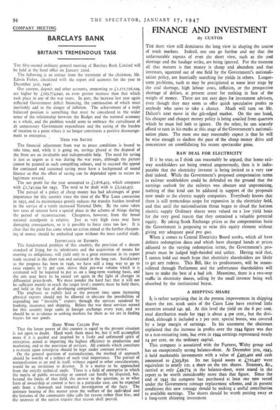FINANCE AND INVESTMENT
By CUSTOS THE short view still dominates the long view in shaping the course of stock markets. Indeed, one can go further and say that the unfavourable aspects of even the short view, such as the call shortage and the haulage strike, are being ignored. For the moment all that matters is that money is cheap and abundant and that investors, squeezed out of one field by the Government's nationali- sation policy, are frantically searching for yields in others. Longer- term problems, such as may be precipitated at some later stage by the coal shortage, high labour costs, -inflation, or the prospective shortage of dollars, at present count for nothing in face of the weight of money. These are not easy days for investment advisers, even though they may seem to offer quick speculative profits to anybody who cares to take a chance. Much will turn on Mr. Dalton's next move in the gilt-edged market. On the one hand, his cheaper and cheaper money policy is being assailed from quarters which he must feel loth to ignore. On the other, he can scarcely afford to turn in his tracks at this stage of the Government's nationali- sation plans. The most one may reasonably expect is that he will be wise enough to slacken the pace of the cheap money drive and concentrate on consdlidating his recent spectacular gains.
RAW DEAL FOR ELECTRICITY If it be true; as I think can reasonably be argued, that home rail- way stockholders are being treated ungenerously, then it is indis- putable that the electricity investor is being invited to a very raw deal indeed. While the Government's proposed compensation terms to railway stockholders could be defended on the ground that the earnings outlook for the railways was obscure and unpromising, nothing of that kind can be adduced in support of the proposals now made to the electric supply companies. Everybody knows that there is still tremendous scope for expansion in the electricity field, and that until the nationalisation threat began to cloud the horizon electric supply Ordinary shares were valued on a low yield basis for the very good reason that they contained a valuable potential equity. By taking Stock Exchange prices as the compensation basis the Government is proposing to seize this equity element without giving any adequate quid pro quo.
When it comes to Central Electricity Board stocks, which all have definite redemption dates and which have changed hands at prices adjusted to the varying redemption terms, the Government's pro- posals must be judged high-handed and unfair. Having said that, I cannot hold out much hope that electricity shareholders are likely to get any redress. This Bill, like its predecessors, will be steam- rollered through Parliament and the unfortunate shareholders will have to make the best of a bad job. Meantime, there is a two-way traffic in electricity shares, selling by the small investor being well absorbed by the institutional buyer.
A SHIPPING SHARE It is rather surprising that in the present improvement in shipping shares the los. stock units of the Cairn Line have received little attention around 14s. 9d. At this level the yield on the 6 per cent. total distribution made for 1945 is about 4 per cent., but the divi- dend, although it included a 2 per cent. special bonus, was covered by a large margin of earnings. In his statement the chairman explained that the increase in profits over the 1944 figure was due to a non-recurring item, but even in 1944 earnings represented nearly 14 per cent, on the ordinary capital. This company is associated with the Furness, Withy group and has an exceptionally strong balance-sheet. At December 31st, 1945, it held marketable investments with a value of £493,400 and cash amounted to £303,830. Its net liquid assets at £710,407 were equivalent to nearly 125. a share on the los. shares. Steamers, &c., carried at only £49,774 in the balance-sheet, were stated in the report to be worth considerably more than that figure. Since the end of 1945 the company has purchased at least one new vessel under the Government tonnage replacement scheme, and in present conditions this new tonnage should be making a useful contribution to available 'earnings. The shares should be worth putting away as a long-term shipping investment


































 Previous page
Previous page